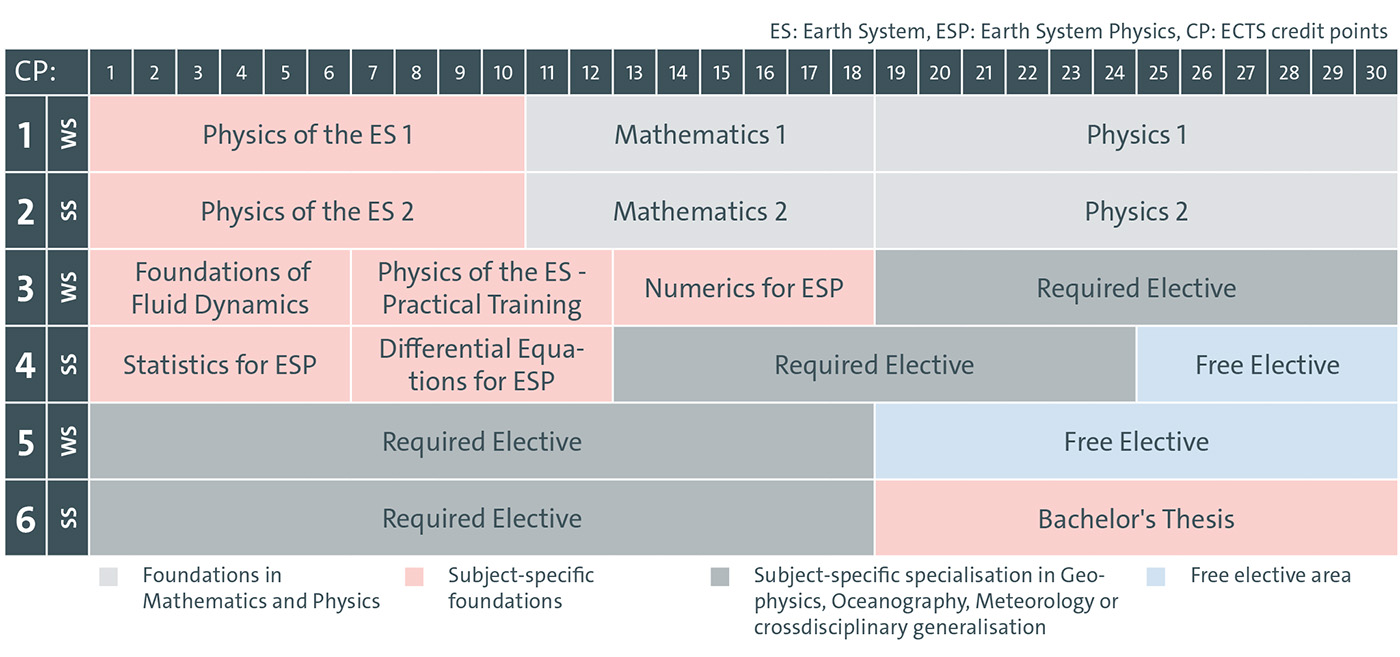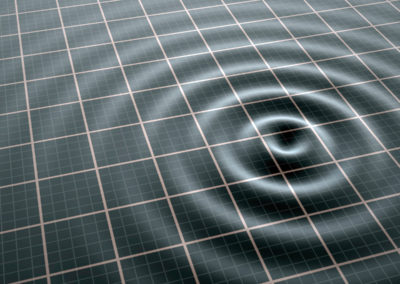Earth System Physics
(English-language Bachelor)
Earth System Physics
(English-language Bachelor)
Observation methods, interpretation procedures and modeling — the English-language Bachelor’s degree course in Earth System Physics lays the foundations for the physical description of the dynamic processes of the solid Earth, the oceans and the atmosphere. Here you can find out everything about the course content, the course structure and career opportunities.
Earth System Physics
The English-language Bachelor’s program Earth System Physics (BSc) is a study program offered by the disciplines of Geophysics, Oceanography and Meteorology within the department of Earth System Sciences.
This interdisciplinary program is the right fit for you if you are driven by the curiosity to gain a holistic understanding of the physics of the Earth system and to understand how its key components function physically. You will acquire the scientific foundations to investigate and describe the dynamics of the solid Earth, oceans, and atmosphere using physical and mathematical methods. Through this program, you will learn about important topics such as earthquakes, climate change, and hurricanes— areas of great public interest. You will gain skills in observation methods, interpretation procedures, and modeling techniques. The study program is closely linked to current research in the respective disciplines, offering you opportunities to engage in research projects early on, participate in measurement campaigns, and work with data evaluation and modeling.
The Bachelor’s program Earth System Physics (BSc) replaces the former German-language Bachelor’s program Geophysik/Ozeanographie (B.Sc.) starting in the Winter Semester 2025/26.
Your study
Understanding the dynamic processes of the Earth system requires a sound education in mathematics and physics. These foundations are combined with an introduction to Earth system sciences in the first three semesters. Beginning in the third semester, there is a steadily growing proportion of core elective courses, which enables students to choose modules within the Earth system sciences or to specialize in a field of their interest. A large fraction of additional free electives allows cross-disciplinary education beyond Earth system physics. In the third year of study no compulsory modules are scheduled. The 5th semester is ideally suited for a stay abroad. In the 6th semester students write a Bachelor’s thesis on a research topic of their choice. Embedded in a research group and under supervision they investigate and document a current question in the field of Earth system physics.
On the University of Hamburg
What sets this program apart is its strong integration with world-class research. Students have the opportunity to engage with the Cluster of Excellence “Climate, Climatic Change, and Society” (CLICCS), a collaborative network of 12 premier climate research institutions in Hamburg. Teaching and research are conducted in close cooperation with key partners such as the Max Planck Institute for Meteorology (MPI‑M), Hereon, and the German Climate Computing Center (DKRZ). This partnership provides access to top-tier expertise, fosters interdisciplinary learning, and opens doors to international academic and research networks—making Hamburg an outstanding place to begin your journey in Earth system sciences.
- https://www.ifm.uni-hamburg.de/en/blog/seepraktikum.html
- https://www.cen.uni-hamburg.de/en/about-cen/news/07-news-2024/2024–07-12-meteor.html
- https://www.cen.uni-hamburg.de/en/about-cen/news/07-news-2024/2024–03-12-hunga-tonga-hovarth.html
- https://pdvideosdaserste‑a.akamaihd.net/int/2020/11/09/de53d616-a738-42fe-86c9-d000a5b45f6b/1280–1_781247.mp4 (German only)
- Forschungsschwerpunkt „Klima, Erde, Umwelt“ https://www.youtube.com/watch?v=DFnsDjEinFU (German only)
Career prospects
The program structure offers a great deal of freedom and flexibility in the selection of courses, enabling either a disciplinary focus on one subject area or a broad interdisciplinary education. Students can tailor their studies to their individual interests and career aspirations. The holistic view of the Earth system opens up excellent career prospects both in the field of academic research and in industry.
Most alumni continue their career in subsequent Master’s programs at the University of Hamburg (e.g. Atmospheric Science (MSc), Geophysics (MSc), Ocean and Climate Physics (MSc) or Integrated Climate System Sciences (MSc)) or at other national and international universities, often continuing in a research or academic career afterwards. Alternatively, a Bachelor’s and particularly a Master’s degree in the field of Earth system physics equally qualifies for a career in the private sector. Experts in Earth system physics are for example needed in georesources, renewable energies, data science, system administration, large data processing, consulting, and in public agencies or science communication.
Curriculum of the Bachelor’s degree program Earth System Physics

Do you have any questions?
All information about the program
General student advisory service
Good to know!
Is there an NC? How high is it?
How the application works
Start of studies information
Well prepared!
MINTFIT Math, Physics



